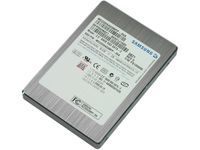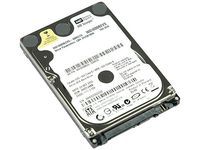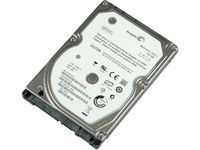Intel's X25-M Solid State Drive Reviewed
Competitors: Only Samsung, Really
Samsung sent us another Dell Latitude D630 notebook to compare its 64 GB SSD SATA-2 with a 5,400 RPM, 160 GB Western Digital Scorpio hard drive. Obviously, this drive doesn’t seem appropriate for such a shootout, as it’s an average mainstream product. We decided to use this drive, a brand new Seagate Momentus 7200.3, the Samsung 64 GB SSD SATA-2 and Intel’s new X25-M flash SSD in a detailed comparison.
Samsung 64 GB SSD SATA-2 (SLC Flash)

We last looked at Samsung’s state-of-the-art flash SSD in our 14-drive roundup a month ago. So far, this has not been the fastest, but still one of the higher performing flash-based SSD drives; it is also the one that delivered by far the best performance per watt across our benchmarks. It comes in a 64 GB capacity and is still rather expensive at around $ 1,000, but this is what you have to spend if you want the best solution available.


Western Digital Scorpio WD1600BEVS, 160 GB, 5,400 RPM

WD’s Scorpio is a mainstream hard drive that delivers solid performance at an attractive price. It utilizes a SATA/300 interface and the common 5,400 RPM spindle speed, together with an 8 MB cache memory. Access time is average, and so is the drive’s power consumption. Its transfer rates beat first generation 7,200 RPM drives, but the drive is left behind if it has to compete with today’s new flash SSDs. Please have a look at our article WD Brings 250 GB to Notebooks to read about the 250 GB version of the Scorpio.


Seagate Momentus 7200.3, 320 GB, 7,200 RPM

This is the comparison drive we selected to represent the 7,200 RPM market segment. It is one of the fastest drives, yet offers the maximum current capacity of 320 GB in the mobile high-end segment. The flash SSDs look pretty anemic with their 64 GB or 80 GB capacities compared to 320 GB, so if you need more storage capacity you’ll probably have to stay with a hard drive. In every other case, the Momentus drive may be much faster than WD’s Scorpio, but it cannot do anything against the two flash SSDs—Intel’s new X25-M in particular. See the article Next-Generation 7,200 RPM Notebook Hard Drives.
Stay on the Cutting Edge
Join the experts who read Tom's Hardware for the inside track on enthusiast PC tech news — and have for over 25 years. We'll send breaking news and in-depth reviews of CPUs, GPUs, AI, maker hardware and more straight to your inbox.


Current page: Competitors: Only Samsung, Really
Prev Page Inside the X25-M Controller: Wear Leveling, Write Amplification Control Next Page Test System for Low Level BenchmarksMost Popular

